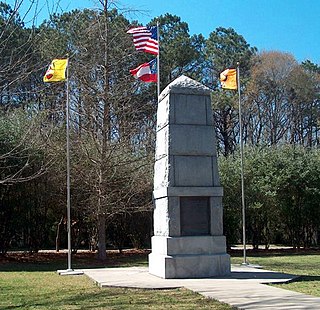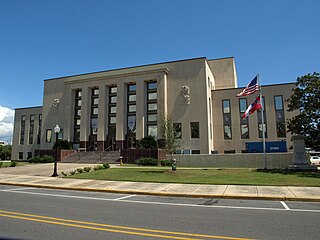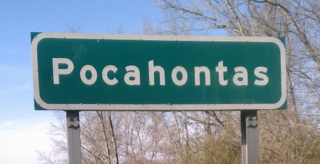
Jackson, officially the City of Jackson, is the capital of and the most populous city in the U.S. state of Mississippi. The city is also one of two county seats of Hinds County, along with Raymond. The city had a population of 153,701 at the 2020 census, down from 173,514 at the 2010 census. Jackson's population declined more between 2010 and 2020 (11.42%) than any major city in the United States. Jackson is the anchor for the Jackson metropolitan statistical area, the largest metropolitan area completely within the state. With a 2020 population estimated around 600,000, metropolitan Jackson is home to over one-fifth of Mississippi's population. The city sits on the Pearl River and is located in the greater Jackson Prairie region of Mississippi.

James Howard Meredith is an American civil rights activist, writer, political adviser, and Air Force veteran who became, in 1962, the first African-American student admitted to the racially segregated University of Mississippi after the intervention of the federal government. Inspired by President John F. Kennedy's inaugural address, Meredith decided to exercise his constitutional rights and apply to the University of Mississippi. His goal was to put pressure on the Kennedy administration to enforce civil rights for African Americans.

The Trail of Tears was an ethnic cleansing and forced displacement of approximately 60,000 people of the "Five Civilized Tribes" between 1830 and 1850 by the United States government. As part of the Indian removal, members of the Cherokee, Muscogee (Creek), Seminole, Chickasaw, and Choctaw nations were forcibly removed from their ancestral homelands in the Southeastern United States to newly designated Indian Territory west of the Mississippi River after the passage of the Indian Removal Act in 1830. The Cherokee removal in 1838 was brought on by the discovery of gold near Dahlonega, Georgia, in 1828, resulting in the Georgia Gold Rush.

Jackson County is a county located in the U.S. state of Mississippi. As of the 2020 census, the population was 143,252, making it the fifth-most populous county in Mississippi. Its county seat is Pascagoula. The county was named for Andrew Jackson, general in the United States Army and afterward President of the United States.

Coahoma County is a county located in the U.S. state of Mississippi. As of the 2020 census, the population was 21,390. Its county seat is Clarksdale.

Greenwood is a city in and the county seat of Leflore County, Mississippi, United States, located at the eastern edge of the Mississippi Delta region, approximately 96 miles north of the state capital, Jackson, and 130 miles south of the riverport of Memphis, Tennessee. It was a center of cotton planter culture in the 19th century.

Medgar Wiley Evers was an American civil rights activist and the NAACP's first field secretary in Mississippi, who was murdered by Byron De La Beckwith. Evers, a decorated U.S. Army combat veteran who had served in World War II, was engaged in efforts to overturn segregation at the University of Mississippi, end the segregation of public facilities, and expand opportunities for African Americans including the enforcement of voting rights.

Minter City is an unincorporated community in Leflore County and Tallahatchie County, Mississippi. It is part of the Greenwood, Mississippi micropolitan area, and is within the Mississippi Delta.

The Pearl River is a river in the U.S. states of Mississippi and Louisiana. It forms in Neshoba County, Mississippi from the confluence of Nanih Waiya and Tallahaga creeks, and has a meander length of 444 miles (715 km). The lower part of the river forms part of the boundary between Mississippi and Louisiana.

West Tennessee is one of the three Grand Divisions of the U.S. state of Tennessee that roughly comprises the western quarter of the state. The region includes 21 counties between the Tennessee and Mississippi rivers, delineated by state law. Its geography consists primarily of flat lands with rich soil and vast floodplain areas of the Mississippi River. Of the three regions, West Tennessee is the most sharply defined geographically, and is the lowest-lying. It is both the least populous and smallest, in land area, of the three Grand Divisions. Its largest city is Memphis, the state's second most populous city.

Mississippi was the second southern state to declare its secession from the United States, doing so on January 9, 1861. It joined with six other southern states to form the Confederacy on February 4, 1861. Mississippi's location along the lengthy Mississippi River made it strategically important to both the Union and the Confederacy; dozens of battles were fought in the state as armies repeatedly clashed near key towns and transportation nodes.
Eastabuchie is a census-designated place and unincorporated community in southwestern Jones County, Mississippi. It is located along U.S. Route 11, just north of the Forrest County line. the community has a post office with the ZIP code 39436. Eastabuchie is part of the Laurel Micropolitan Statistical Area.

Pocahontas is an unincorporated community located in northern Hinds County, Mississippi on U.S. Route 49. It is located 5 miles (8.0 km) south of Flora and 9 miles (14 km) north of Jackson and part of the Jackson Metropolitan Statistical Area. Pocahontas has a ZIP code 39072.

Bruinsburg is a ghost town in Claiborne County, Mississippi, United States.
Australia is a former town located in Bolivar County, Mississippi, United States. Australia was located on the Mississippi River.
Liverpool is a ghost town in Yazoo County, Mississippi, United States. Liverpool Landing, the settlement's port on the Yazoo River, was located 0.9 mi (1.4 km) west of Liverpool.
Sunflower Landing is an unincorporated community in Coahoma County, Mississippi, United States.
Belmont is an extinct town in Mississippi County, on the eastern border of the U.S. state of Missouri at the Mississippi River. The GNIS classifies it as a populated place under the name "Belmont Landing".
Poticaw Bayou is a stream in the U.S. state of Mississippi. It is a tributary to the West Pascagoula River.
Pushmataha Landing, also known as Pushmataha, is an unincorporated community located in Coahoma County, Mississippi, United States.















